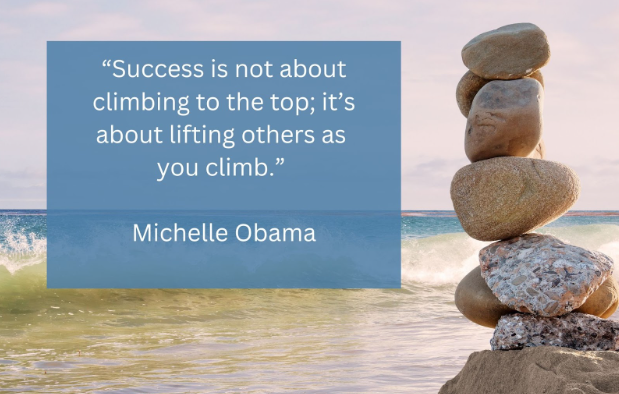Womens’ Secret Leadership Skill: Compassionate Strength

What would be the impact if women’s voices drove more of the decision-making processes in all fields of life? How would this impact personal, family, and community? How would it impact government, education, and business?
Not recognizing and utilizing the unique contribution that women in positions of power make naturally, just by virtue of being women, is detrimental to both women and society as a whole.
About women and leadership
Christine Lagarde, the first woman to hold the position of Managing Director of the International Monetary Fund, says, “Women bring their different ways of looking at the world to leadership roles; it can lead to more innovative and effective solutions.”
Women have many qualities that make them good leaders. These traits may be associated with leadership in general, but are more universally recognized as qualities that are more specific to women:
- Empathy: Recognizing and sharing the emotions of others, while being alert to the needs and perspectives of team members.
- Collaboration: Working well with others, and fostering a spirit of cooperation
- Inclusiveness: Ensuring everyone feels valued and is included
- Emotional intelligence: the ability to manage both one’s own emotions and understand the emotions of others
- Resilience: Navigating and overcoming stress and adversity.
- Creativity: Promoting innovation
- Networking: Cultivating and maintaining productive relationships with others.
Considering these qualities, it’s not surprising that women leaders often excel in collaborative and inclusive leadership styles. They tend to focus on empowering their teams, fostering a supportive environment, and prioritizing collective success over individual recognition.
An analysis of thousands of 360-degree reviews (a continuous performance management strategy aimed at helping employees at all levels) revealed that women scored as excellent leaders in a list of 19 capabilities, according to Harvard Business Review.
In addition, scientific research findings and the perspective of many world class thinkers indicate that women leaders prioritize social issues such as healthcare, education, and community welfare, leading to healthier, more prosperous and resilient communities. For example, a study conducted by S&P Global found that in the two years following their appointments, “Female CEOs saw a 20% increase in stock price momentum.” Additionally, companies with more gender diversity on their executive board were more profitable than those without. 1
Also, according to the International Peace Initiative, peace agreements are 35% more likely to last at least 15 years if women leaders are engaged in its creation and execution. 2
Women’s leadership within households including decisions about property and household income has a profound impact on access to education and healthcare for their families. For example, “Women are more likely … to invest a large proportion of their household income in the education of their children.” 3, 4
Warren Buffett has said, “ Women make me optimistic about America.”
Sheryl Sandberg, former Facebook COO, technology executive, philanthropist, and writer, founder of LeanIn.Org, states, “We need women at all levels, including the top, to change the dynamic, reshape the conversation, to make sure women’s voices are heard and heeded, not overlooked and ignored.”
Women would reshape leadership paradigms to reflect women’s unique capabilities, such as those noted by the Dali Lama November 29, 2018:
“I call on the next generation of young women to be the mothers of the Compassionate Revolution that this century so desperately needs. You have a special role to play in creating a better world. It is often thought that women are more empathic and sensitive, and more receptive to the feelings of others. These are qualities that are embodied by mothers. In this sense, women are models of humanity.”
Creating leaders
Recognition and an embrace of the unique contributions of women in leadership roles is not just beneficial but essential for the development of a prosperous society.
“The ultimate leadership— to be able to remain imperturbable in the eye of the hurricane. To be able no matter what happens to take it in stride, to be able to address it, and for me that’s a function of judgment and not of stamina. What the country is missing is wisdom and I think women have a tremendous capacity to bring that. It’s the most important function of leadership. It means being able to see the icebergs before they hit the Titanic and why we are drowning in data and starved for wisdom. I think women have an incredible opportunity to come to the forefront and provide it.” – Arianna Huffington
Every leader should learn the Transcendental Meditation technique. TM sharpens mental clarity, making it easier to concentrate and make decisions. It promotes better overall cognitive functioning and improved emotional wellbeing: The practice expands awareness along with the ability to focus sharply. The TM technique also increases calmness, clarity, creativity and efficiency, while significantly reducing stress—all these qualities are essential for any leader at any level.
In summary, embracing women’s unique contributions in leadership roles is not just beneficial but essential for the development of a prosperous, equitable and peaceful society.
The dignity of a woman’s life is infinite, her status immeasurable, her capacity unbounded, her role divine…In the fast changing world of today, her vision penetrates into the reality of the far beyond, the reality which endures beyond change.
– Maharishi Mahesh Yogi, Founder of the Transcendental Meditation Program.
1. https://www.proactiveinvestors.com.au/companies/news/1042713/research-reveals-female-ceos
2. https://www.ipinst.org/wp-content/uploads/2015/06/IPI-E-pub-Reimagining-Peacemaking.pdf
3. https://www.imf.org/external/pubs/ft/sdn/2013/sdn1310.pdf
Develop your full potential as a leader: contact a certified TM teacher
About the Author
Vanessa Vidal is the national director of TM for Women in the USA





